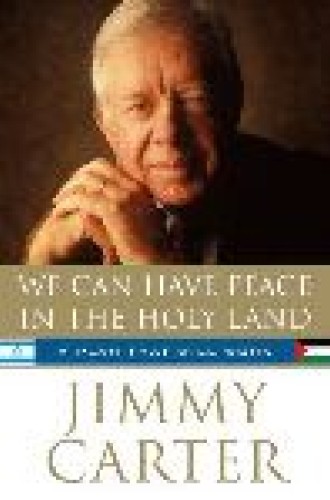Brokering Mideast peace
Like the proverbial giant empire hobbled by small tribes, the U.S. has been unable to use its power to resolve the long-festering Israeli-Palestinian conflict. American diplomacy, burdened by ideology, ineptitude and frequent deference to Israeli wishes, has been behind the curve for decades.
There are signs, however, that the Obama administration is determined to learn from past mistakes and make a new push to establish a two-state peace. The goal is to restore American interests in the region and to meet the basic needs of both Israelis and Palestinians: peace and security for Israel and liberation for Palestinians.
The two parties are incapable of making peace by themselves because of their dysfunctional politics. Strong, sustained U.S. leadership is needed. The appointment of George Mitchell as Middle East envoy was a sign of President Obama’s serious intent to deal actively with the Arab-Israeli conflict. Nevertheless, the challenges to making peace are formidable. Because of the collapse of the Oslo talks, the terrible deeds of mutual violence, and aggressive Israeli policies of settlement and occupation, many Israelis and Palestinians now doubt that a two-state peace is possible. Palestinians do not believe that Israel wants peace, given its 40-year national project of Jewish settlement that has dramatically transformed the West Bank and East Jerusalem into Israeli colonies. The Oslo negotiations launched in 1993 were expected to end occupation and create two states, but the opposite has occurred: the settler populace in the West Bank has risen from 110,000 to 290,000.
West Bank settlements are still expanding in defiance of Washington’s requests for a freeze. Israel unilaterally withdrew 8,000 Israeli settlers from Gaza in 2005, but its domination of the West Bank has been consolidated by a thickening of settlements and a massive 486-mile security barrier, large parts of which cut deep into Palestinian territory. The barrier is part of a larger matrix of Israeli control that includes roads between settlements for settlers only and over 600 checkpoints that restrict Palestinians in dozens of enclaves.
Forty years of settlement growth have created a de facto one-state reality in the West Bank. The feeble Palestinian Authority in Ramallah is seen as a client of Israel. Gaza is controlled internally by a hostile rejectionist Hamas regime, but it has for two years been subjected to a harsh Israeli siege. These purposeful facts on the ground have created a situation that is incompatible with the creation of a genuine Palestinian state living at peace with Israel. Palestinians have reason to despair.
Many Israelis have also abandoned hope. Most regret the settlement adventure. They recognize that the settlement and occupation of the West Bank corrupts Israel and threatens its Jewish, democratic character, given the fact that Palestinians will soon constitute a demographic majority. Notwithstanding their military might, Israelis are traumatized by Palestinian violence and deeply insecure. Heavily influenced by the patriotic narrative of their leadership, which is dominated by the military-security establishment, they tend to minimize Israel’s share of the blame. Most interpret Palestinian suicide terror during the intifada, the rise of Hamas, and rockets from Gaza as proof of Palestinian hatred and rejection. Israelis see themselves as the principal victim, and they fear that ending the occupation would unleash Palestinian vengeance and be even more dangerous than the status quo. They also worry that a policy of withdrawal from settlements would provoke civil war with armed, messianic settlers.
The first challenge of a new American policy must therefore be to create hope and confidence among Israelis and Palestinians that peace is possible. The need for strong American leadership and a promising vision of peace is the message of former president Jimmy Carter’s book We Can Have Peace in the Holy Land, a follow-up to his best seller Palestine: Peace Not Apartheid. The latter book created an uproar in conservative Jewish circles for predicting that if Israel does not abandon its occupation, it will maintain an unequal system for Palestinians comparable to South Africa’s apartheid. In the preface to his new book, Carter says he used the word apartheid to provoke discussion, recognizing that Israeli critics of their government often use it. In retrospect, he says, he should have known it could be misunderstood and seen as a way of accusing Israel of a race-based policy. (After Palestine: Peace Not Apartheid was published, former Israeli prime minister Ehud Olmert himself warned that by clinging to policies of settlement and occupation Israel would create a South Africa kind of situation that would ultimately lead to the end of Israel.)
Carter acknowledges that Palestinian and Israeli leadership has been lacking, and he believes that the U.S. can summon the moral and political leadership to win the peace. Without this commitment, he predicts, as do many others, that a one-state reality will emerge, with disastrous consequences for Israel and Palestine, and for American interests as well.
Carter does not believe that Hamas is a permanent obstacle to peace. He describes his extensive conversation with Hamas officials and Khalid Meshal, the head of Hamas’s politburo in Damascus, and concludes that Hamas can be brought into a two-state agreement. Carter thinks that Hamas is prepared to accept reconciliation with Fatah and peace with Israel in return for an Israeli withdrawal from all occupied territories and Palestinian sovereignty in the West Bank, Gaza and East Jerusalem.
Carter calls for linking an American peace plan with the 2002 Arab League peace initiative, which promised peace and normal relations with Israel if it withdraws from the occupied territories and negotiates agreements with the Palestinians on final status issues. He cites polls showing that both peoples support a two-state peace. Acknowledging Israel’s need for security assurances, Carter recommends that a multinational peacekeeping force provide security during a transition to peace.
In contrast to Carter’s forward-looking, optimistic ap proach, Israeli historian Benny Morris reflects the deep pessimism in Israel. Morris earlier published a pathbreaking book on the 1948 war and the Palestinian refugee problem that shattered many patriotic myths. His history of the Arab-Israeli conflict, Righteous Victims, is a scrupulous examination of the pathologies and mistakes of both Israelis and Palestinians.
But during the past decade Morris has sometimes abandoned scholarly discipline, becoming an angry, partisan critic of Palestinians, whom he blames for the failure to reach a peace. In a polemical essay written with former Israeli prime minister Ehud Barak in the New York Review of Books (June 27, 2002), Morris blames the failure of the Oslo process entirely on Yasir Arafat and describes “Arafat and his ilk in the Palestinian camp” as “vicious, untrustworthy, unacceptable reprobates and recidivists.”
One State, Two States continues in this vein. Morris claims that Palestinians have always opposed a two-state peace “in every fiber of their being.” His book was prompted, he writes, by the renewed advocacy by some Palestinians and Western intellectuals for a one-state solution. He believes this call has helped unveil the fact that Palestinian statements of support for two states have always been superficial and deceitful. Morris charges, for example, that the commitment to a two-state peace made by the Palestine National Congress in 1988 was a fraud, and that Palestinians have used lies and “word games” to conceal a primordial goal to destroy Israel and reclaim Palestine.
In support of his thesis Morris seems to have relied heavily on partisan accounts of the failure of the Oslo peace process and of the Camp David summit—accounts that cast the blame on Arafat. He gives no credit to other, more measured analyses, including some by Israeli experts. These other analysts do not exonerate Arafat, but they reject the charge that Palestinian policy over two decades supporting a two-state peace was an elaborate deceit. They cast equal or greater blame on Israeli policies and on U.S. president Bill Clinton.
Morris dismisses as “mendacious” the judgment of America’s leading historian of Palestine, Rashid Khalidi, who, while being critical of the Palestinian national movement, credits it with accepting accommodation with Israel after 1988. Morris also descends to ethnic slurs. He says, for example, that Palestinians resort to suicide bombing because they are “different and behave differently in similar or identical sets of circumstances” than do black Africans, who have also suffered injustice. He also says that Palestinians, like other Muslims, “have no respect for democratic values,” and that although Palestinian Authority president Mahmoud Abbas “dresses appropriately” and makes “the right noises,” he is not sincere about peace.
While devoting much analytical effort to proving Palestinian perfidy, Morris minimizes Israel’s contributions to the conflict, including its frequent reneging on its own commitments. He acknowledges that Israeli settlements “without a doubt complicated the task of [Israeli] leaders bent on making peace with the Palestinians,” but evidently he does not otherwise consider them a major obstacle to a two-state peace—not compared to what he regards as fundamental, unchanging Palestinian rejectionism.
The only scholarly virtue of One State, Two States is Morris’s account of the evolution of the one-state/two-state debate in Zionist history. He argues that the resurrection of the one-state idea in Palestinian and Western circles proves that it is the preferred strategy, not a default option. (Western advocates of a one-state, binational solution, and therefore the end of the Zionist state, are a distinct minority. These advocates mistakenly minimize the historical impetus and the power of the Zionist idea in Israel and among Jews worldwide.)
Morris’s prescription appears in his last few pages. Concluding that a Palestinian state would be a permanent threat to Israel, he recommends that Israel persuade Jordan to take over the West Bank as Israel withdraws from most of it, and that Egypt absorb Gaza. The “Jordan option” for the West Bank and the notion that Gaza can be given to Egypt are hardy chestnuts favored by Israeli opponents of a Palestinian state. They are strategically nonsensical. In 1987 the late King Hussein abandoned Jordan’s claim to the West Bank, recognizing that expanding Jordan’s already large Palestinian community would undermine Hashemite rule. (Morris acknowledges such Hashemite fears, but offers no plausible way to resolve them.) Moreover, once in control of a “greater Palestine” in Jordan, Palestinians might pursue irredentist claims against Israel and be a vastly greater strategic threat to it than a small, disarmed Palestinian buffer state in the West Bank and Gaza. Nor is Egypt remotely interested in absorbing 1.3 million Gazans.
Given the despair of Israelis and their profound sense of insecurity, evoked in Morris’s book, and a similar hopelessness and consequent radicalization in Palestinian society, it is fair to ask if even the most determined U.S.-led peace effort can succeed. On this point, Negotiating Arab-Israeli Peace, by Daniel Kurtzer, a former American ambassador to Egypt and Israel, and Scott Lasensky of the U.S. Institute of Peace, offers some helpful and encouraging guidance. This splendid short analysis of key lessons based on previous U.S. efforts draws on the work of a group of experts, William B. Quandt, Shibley I. Telhami and Steven L. Spiegel, and hundreds of interviews. It should be a handbook for the Obama administration.
Kurtzer and Lasensky believe that strong U.S leadership is indispensable because of weak Israeli and Palestinian leadership and the asymmetry of power between the parties—which U.S. deference to Israel has reinforced. They criticize the “alarming mismanagement” of the Israeli-Palestinian and Israel-Syrian conflicts by the Bush administration since the collapse of the Oslo negotiations in 2000. They are only slightly more charitable toward the Clinton administration.
The book’s most important recommendation is for the U.S. to adopt its policies on the basis of American strategic interests and to stop deferring to (and thus being seen as supporting) Israeli wishes. America must serve as a genuine mediator, not a message carrier for Israel, as it often was during the Oslo process. (Aaron Miller, the deputy U.S. negotiator during the Oslo process, has written that Washington mistakenly saw its role as serving as “Israel’s lawyer.” For years, American diplomats observed the “no surprises” doctrine with Israel—American policies were vetted with Israel before being adopted.)
The authors also argue that the U.S. must drop its traditional and unsuccessful approach favoring incrementalism and “process,” and focus on the end game, drawing on well-known parameters for final status solutions that have been discussed among Israelis, Americans and Palestinians over the years.
The U.S. should acknowledge the domestic concerns of the Israeli leadership but not be overindulgent of them. Washington must be tougher by insisting on the parties’ accountability for their previous commitments and by penalizing violations. U.S. negotiators should avoid picking favorites, and Washington should avoid back-channel communications with the White House that undermine U.S. negotiators. (Secretaries of State Colin Powell and Condoleezza Rice were repeatedly undercut by successful Israeli appeals to the White House.) The president must avoid preemptive surrender to domestic opposition and must build a peace coalition among domestic constituencies, including the Jewish community.
Some of these recommendations may sound like truisms—as, for example, that the U.S. needs an “American” policy toward the Arab-Israeli conflict that is “made in Washington.” But because of the reticence of American discourse about Israel, the fact is that the U.S. has often not had its own policies. The unusual clarity and candor of Negotiating Arab-Israeli Peace are thus very welcome. The authors acknowledge that the challenge of transforming Israeli and Palestinian national credos and policies is huge and that the time for peacemaking is growing short. But they still believe that the U.S. can recover its leadership role, become an honest broker for peace, secure American interests and help rescue Israelis and Palestinians from a grim future.







